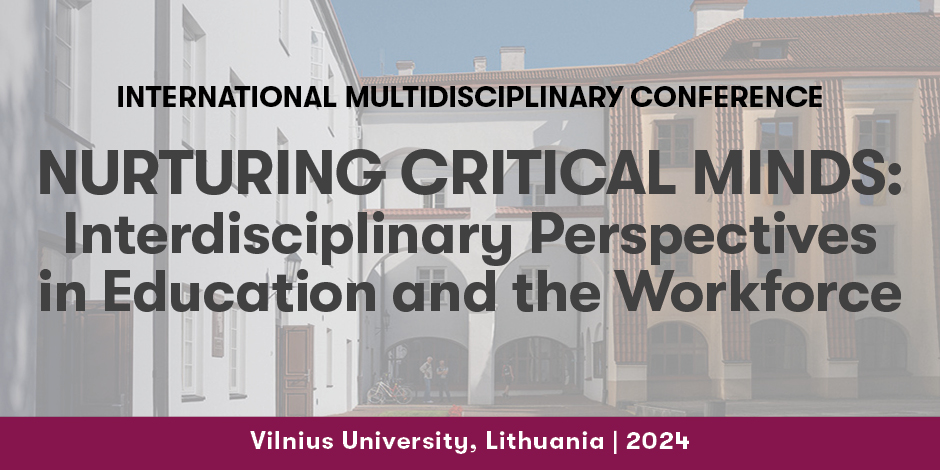
The Institute of Foreign Languages at the Faculty of Philology, in collaboration with the University of Western Macedonia (Greece), is organizing an international interdisciplinary conference titled “Nurturing Critical Minds: Interdisciplinary Perspectives in Education and the Workforce.” This event will occur at Vilnius University, Faculty of Philology, Lithuania, on 27–28 June 2024. The conference is also supported by various faculties of Vilnius University, including the Faculty of Economics and Business Administration, the Faculty of Medicine, the Faculty of Mathematics and Informatics, and the Faculty of Philosophy.
The primary aim of the conference is to explore the development of critical thinking (CT), a crucial skill for university graduates in the 21st century. Critical thinking is essential for effective participation in society and success in professional careers. Educational institutions are tasked with equipping students with CT skills, which labor market institutions highly value for their ability to solve complex problems and offer innovative solutions. Consequently, university curricula must focus on developing both discipline-specific and general competencies.
CT development is a key learning outcome across various disciplines in university programs. Speaking about the reasons for organising this conference, the Director of the Institute of Foreign Languages, serving as Chair of the Conference Organizing and Scientific Committees Prof. Roma Kriaučiūnienė, emphasizes the importance of integrating general competencies into foreign language teaching and learning. This aligns with the Institute's research objectives, which include investigating how CT and general competencies are cultivated in language education. The conference was also inspired by the Institute's participation in the Erasmus+ project Think4Jobs, which addressed CT development in teacher education, foreign language teaching, economics, IT, and medicine.
Research by El Soufia and See (2019) highlights that explicit instruction of CT skills is most effective. Despite the emphasis on CT in higher education, these skills are often not taught systematically at the undergraduate level. The conference aims to raise educators' awareness of the need for explicit CT instruction and to explore the best methods for achieving this.
By adopting a holistic approach, the conference will examine the role of CT in various academic disciplines and its importance in the labor market. The interdisciplinary nature of the conference will bring together diverse perspectives on CT development in university education.
The Vice-Dean for Strategy and General Affairs of the Faculty of Mathematics and Informatics at Vilnius University Prof. Jurgita Markevičiūtė underscores the importance of CT in data sciences: “In today's world, we are surrounded by a wealth of data, which is easy to manipulate and draw false conclusions from. Teaching statistics with critical thinking enables students to go beyond memorizing formulas and procedures. It develops their ability to analyze data, interpret results, and draw meaningful conclusions while adhering to ethical principles.”
The conference aims to present research on CT development across various university disciplines, share best practices, raise awareness about the importance of CT, and highlight exemplary practices. It will serve as a platform for educators, researchers, and labor market professionals to explore innovative strategies, share insights, and collaborate on integrating CT skills into educational curricula.
The event programme
